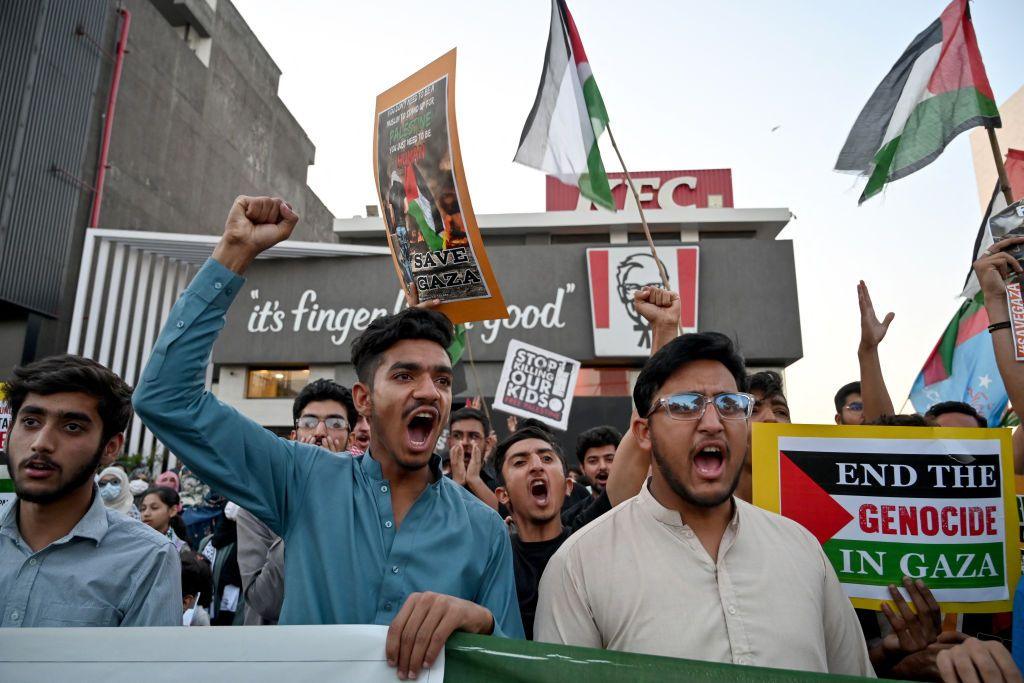One dead after protests against KFC branches in Pakistan

Police have been stationed outside KFCs across major cities
- Published
Police in Pakistan have made dozens of arrests following a string of protests targeting KFC branches across the country which led to one man being killed.
Protesters, angry at the war in Gaza, have been urging a boycott of the chain, claiming it's a symbol of the United States and its ally Israel.
At least 20 attempted attacks on KFC outlets have been recorded across the country in the past week, Pakistan's Minister of State for the Interior Talal Chaudhry told the BBC.
Videos on social media show mobs armed with iron rods entering KFC stores and threatening to burn them down before police arrive to arrest protesters. In Karachi, two stores were set on fire.
A video on social media shows a man yelling, "They are buying bullets with the money you make."
Condemning the violence, Chaudhry said that "most of the vendors involved are Pakistani" and "the profits go to Pakistanis".
A police officer confirmed to BBC News that the man who was killed, 45-year-old Asif Nawaz, was a staff member at KFC who was shot during one of the protests in the city of Sheikhupura, on the outskirts of Lahore, on 14 April.
Sheikhupura Regional Police Officer Athar Ismail said Nawaz was working in the kitchen at the time and was hit in the shoulder by a bullet that was fired from a pistol more than 100ft away. He told BBC News that the main culprit is still at large, but that police have made 40 arrests so far.
A bullet fired from that distance is not usually fatal, but a post-mortem found that after hitting his shoulder, the bullet travelled towards his chest.
Mr Ismail told BBC News there was no evidence so far that suggested Mr Nawaz was the intended target and the shooting may have been accidental.

There have been protests in Pakistan outside western brands like KFC since last year
Across Pakistan, influential figures have condemned the war in Gaza.
The Islamist party, Tehreek-e-Labbaik Pakistan (TLP) has called for protests against Israel and the US, but has denied any involvement in the attacks on KFC.
Pakistan's most influential Sunni scholar, Mufti Taqi Usmani, has encouraged a boycott of products perceived to be linked to the war.
But both have urged protesters to avoid resorting to violence.
Usmani said in remarks made at the National Palestine Conference on Thursday that while it was essential to boycott products and companies from or linked to Israel, Islam "is not a religion that encourages harming others" and said it is prohibited to "throw stones or put anyone's life at risk".
"So, continue your protest and boycott, but do so in a peaceful manner. There should not be any element of violence or non-peaceful behavior," he said.
TLP spokesman Rehan Mohsin Khan said the group "has urged Muslims to boycott Israeli products, but it has not given any call for protest outside KFC".
There have been several cases of Western brands facing attacks, boycotts and protests in Pakistan and other Muslim countries since Israel's war on Gaza began.
Last year, McDonald's confirmed it would buy back all of its Israeli restaurants because a boycott over its perceived support for Israel caused a sales slump.
In 2023, Starbucks called for peace and blamed "misrepresentation" of its views after a series of protests and boycott campaigns in part tied to the Israel-Gaza war.
KFC and its parent company Yum Brands have not yet responded to the BBC's request for comment.